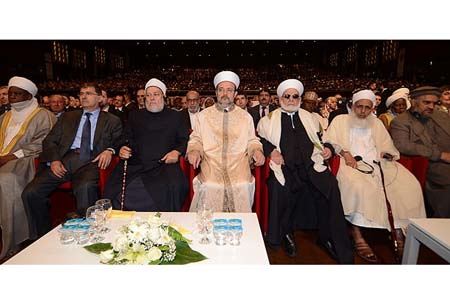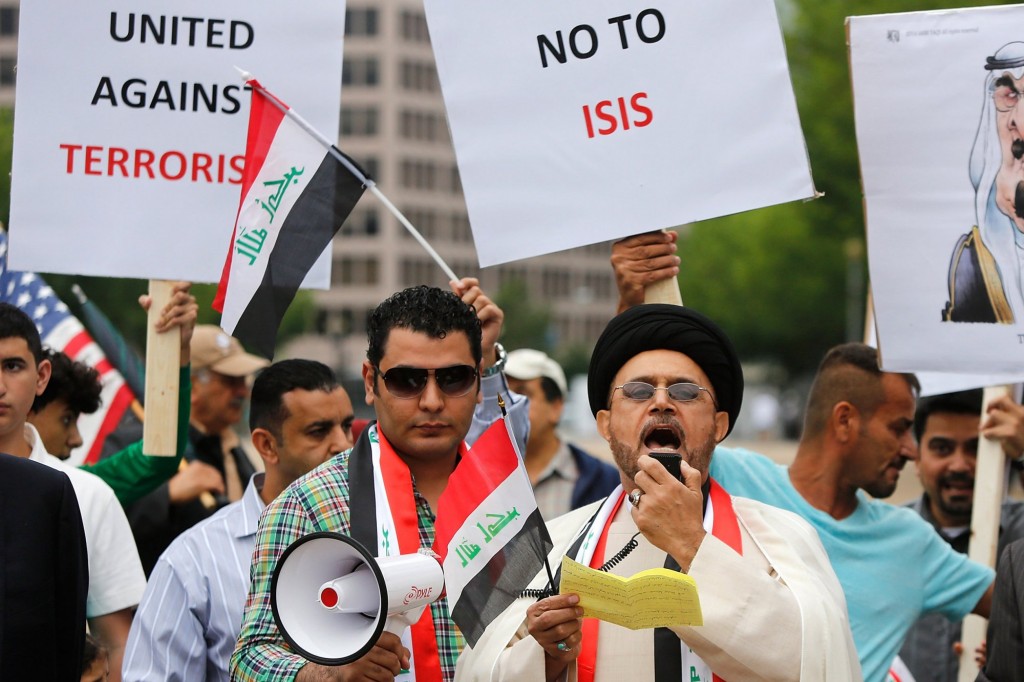Muslim Scholars Release Open Letter To Islamic State Meticulously Blasting Its Ideology
![]()
WASHINGTON; More than 120 Muslim scholars from around the world joined an open letter to the “fighters and followers” of the Islamic State, denouncing them as un-Islamic by using the most Islamic of terms.
Relying heavily on the Quran, the 18-page letter released Wednesday (Sept. 24) picks apart the extremist ideology of the militants who have left a wake of brutal death and destruction in their bid to establish a transnational Islamic state in Iraq and Syria.
Even translated into English, the letter will still sound alien to most Americans, said Nihad Awad, executive director of the Council of American-Islamic Relations, who released it in Washington with 10 other American Muslim religious and civil rights leaders.
“The letter is written in Arabic. It is using heavy classical religious texts and classical religious scholars that ISIS has used to mobilize young people to join its forces,” said Awad, using one of the acronyms for the group. “This letter is not meant for a liberal audience.”
Even mainstream Muslims, he said, may find it difficult to understand.

Awad said its aim is to offer a comprehensive Islamic refutation, “point-by-point,” to the philosophy of the Islamic State and the violence it has perpetrated. The letter’s authors include well-known religious and scholarly figures in the Muslim world, including Sheikh Shawqi Allam, the grand mufti of Egypt, and Sheikh Muhammad Ahmad Hussein, the mufti of Jerusalem and All Palestine.
A translated 24-point summary of the letter includes the following: “It is forbidden in Islam to torture”; “It is forbidden in Islam to attribute evil acts to God”; and “It is forbidden in Islam to declare people non-Muslims until he (or she) openly declares disbelief.”

This is not the first time Muslim leaders have joined to condemn the Islamic State. The chairman of the Central Council of Muslims in Germany, Aiman Mazyek, for example, last week told the nation’s Muslims that they should speak out against the “terrorist and murderers” who fight for the Islamic State and who have dragged Islam “through the mud.”
But the Muslim leaders who endorsed Wednesday’s letter called it an unprecedented refutation of the Islamic State ideology from a collaboration of religious scholars. It is addressed to the group’s self-anointed leader, Abu Bakr Al-Baghdadi, and “the fighters and followers of the self-declared ‘Islamic State.’”
But the words “Islamic State” are in quotes, and the Muslim leaders who released the letter asked people to stop using the term, arguing that it plays into the group’s unfounded logic that it is protecting Muslim lands from non-Muslims and is resurrecting the caliphate — a state governed by a Muslim leader that once controlled vast swaths of the Middle East.
“Please stop calling them the ‘Islamic State,’ because they are not a state and they are not a religion,” said Ahmed Bedier, a Muslim and the president of United Voices of America, a nonprofit that encourages minority groups to engage in civic life.
President Obama has made a similar point, referring to the Islamic State by one of its acronyms — “the group known as ISIL” — in his speech to the United Nations earlier Wednesday. In that speech, Obama also disconnected the group from Islam.
Enumerating its atrocities — the mass rape of women, the gunning down of children, the starvation of religious minorities — Obama concluded: “No God condones this terror.”
1. It is forbidden in Islam to issue fatwas without all the necessary learning requirements. Even then fatwas must follow Islamic legal theory as defined in the Classical texts. It is also forbidden to cite a portion of a verse from the Qur’an—or part of a verse—to derive a ruling without looking at everything that the Qur’an and Hadith teach related to that matter. In other words, there are strict subjective and objective prerequisites for fatwas, and one cannot ‘cherry-pick’ Qur’anic verses for legal arguments without considering the entire Qur’an and Hadith.
2. It is forbidden in Islam to issue legal rulings about anything without mastery of the Arabic language.
3. It is forbidden in Islam to oversimplify Shari’ah matters and ignore established Islamic sciences.
4. It is permissible in Islam \[for scholars] to differ on any matter, except those fundamentals of religion that all Muslims must know.
5. It is forbidden in Islam to ignore the reality of contemporary times when deriving legal rulings.
6. It is forbidden in Islam to kill the innocent.
7. It is forbidden in Islam to kill emissaries, ambassadors, and diplomats; hence it is forbidden to kill journalists and aid workers.
8. Jihad in Islam is defensive war. It is not permissible without the right cause, the right purpose and without the right rules of conduct.
9. It is forbidden in Islam to declare people non-Muslim unless he (or she) openly declares disbelief.
10. It is forbidden in Islam to harm or mistreat—in any way—Christians or any ‘People of the Scripture’.
11. It is obligatory to consider Yazidis as People of the Scripture.
12. The re-introduction of slavery is forbidden in Islam. It was abolished by universal consensus.
13. It is forbidden in Islam to force people to convert.
14. It is forbidden in Islam to deny women their rights.
15. It is forbidden in Islam to deny children their rights.
16. It is forbidden in Islam to enact legal punishments (hudud) without following the correct
procedures that ensure justice and mercy.
17. It is forbidden in Islam to torture people.
18. It is forbidden in Islam to disfigure the dead.
19. It is forbidden in Islam to attribute evil acts to God.
20. It is forbidden in Islam to destroy the graves and shrines of Prophets and Companions.
21. Armed insurrection is forbidden in Islam for any reason other than clear disbelief by the ruler and not allowing people to pray.
22. It is forbidden in Islam to declare a caliphate without consensus from all Muslims.
23. Loyalty to one’s nation is permissible in Islam.
24. After the death of the Prophet, Islam does not require anyone to emigrate anywhere.
Source:Huff. Post
Add new comment